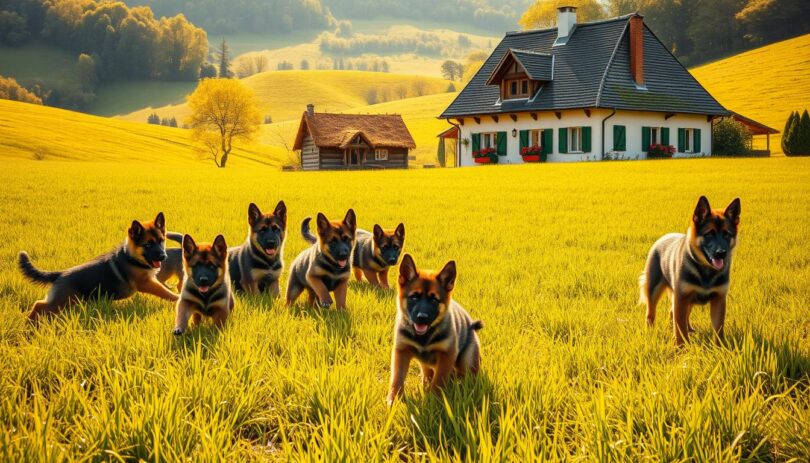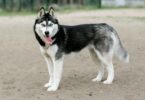Did you know that over 30% of pet owners prioritize cultural significance when naming their furry friends? This guide explores timeless and trendy monikers rooted in Germany’s rich heritage, offering a blend of tradition and modern flair.
Whether you’re welcoming a spirited puppy or honoring ancestry, these titles carry stories that go beyond labels. From strong, historical picks to playful contemporary choices, each selection reflects unique traits and meanings.
Curated from extensive research and expert insights, this list helps you find a perfect match for your companion. For those with white-coated companions, creative options blend aesthetics with cultural depth.
Discover how names like Kaiser (emperor) or Liesel (pledged to God) resonate with personality and history. Upcoming sections will dive into breed-specific trends, ensuring your choice feels as special as your pet.
The Rich History and Cultural Significance of German Dog Names
Centuries of tradition shape the stories behind canine monikers tied to Germany’s cultural identity. These titles often mirror historical roles, regional dialects, and symbolic traits valued by communities over generations.
Roots in Work and Legacy
Many classic titles originated from working roles, like Hüter (guardian) or Falke (falcon). The German Shepherd breed exemplifies this, as its name reflects its original purpose: herding and protecting livestock. Words like “shepherd” carry deep ties to rural lifestyles and practical skills passed through families.
Modern Adaptations of Tradition
Today’s choices blend old-world charm with contemporary flair. Names once reserved for nobility, such as Adel (noble), now celebrate a pet’s regal demeanor. Urbanization and global influences have softened rigid naming rules, allowing playful twists on traditional terms while honoring their origins.
Understanding this evolution helps owners select titles that resonate with a companion’s spirit. Whether inspired by folklore or modern trends, each choice becomes a bridge between past and present.
Traditional German Dog Names for Male and Female Pups
Choosing a name that mirrors heritage while capturing personality creates a lasting bond between owner and pet. Classic titles rooted in tradition often reflect qualities like courage, wisdom, or loyalty—traits many families seek in their furry companions.
Top Male Choices with Timeless Meanings
Names like Alfred (“wise counselor”) or Ferdinand (“bold protector”) highlight virtues admired for generations. These titles often stem from historical figures or linguistic roots tied to strength and leadership. For playful pups, Bruno (“brown bear”) channels energy and resilience.
Female Picks with Cultural Origins
Heidi, derived from nobility-focused terms, embodies grace and charm. Greta, meaning “pearl,” symbolizes rarity and enduring value. Such options blend melodic sounds with layered histories, making them ideal for pets with spirited or gentle personalities.
Curated lists simplify finding titles that honor ancestry while suiting modern lifestyles. Whether inspired by nature, folklore, or virtues, these monikers offer depth beyond surface-level trends.
Embracing Unique and Modern Variations in Dog Naming
Pet owners are increasingly blending creativity with tradition when selecting monikers for their companions. Modern twists on classic choices balance originality with cultural depth, offering fresh alternatives to time-honored titles. For example, Kleo (a playful take on Klara) or Luzi (a spunky spin on Ludwig) preserve German roots while feeling contemporary.
Pop culture and social media shape today’s trends, inspiring inventive options like Fritz for adventurous pups or Nala for spirited personalities. Short, punchy titles such as Benno or Leni work well for training, ensuring quick recognition during commands.
Breed traits often influence these innovations. A sleek Greyhound might suit Ziggy, echoing speed and agility, while a fluffy companion could rock Mila, meaning “gracious.” Many owners now merge historical significance with personal flair—think Rudi (derived from Rudolf) for loyal guardians.
This approach honors heritage while celebrating individuality. Whether drawn to minimalist styles or bold hybrids, pairing meaningful roots with modern vibes creates a name that’s both memorable and rich in story.
Key Considerations When Choosing a German Dog Name
Finding the right title for your furry friend requires careful thought and family collaboration. A well-chosen moniker strengthens your bond and simplifies communication during training. Consensus among household members ensures consistency, while aligning the name with your pet’s traits creates a natural fit.
Matching Name with Personality and Breed
Observe your companion’s behavior and physical features before settling on a title. Energetic pups might suit lively options like Ziggy, while calm breeds could embody serene choices like Frieda. Short, crisp names with one or two syllables work best for quick recall during commands.
Breed-specific characteristics matter. Sturdy guardians often carry strong titles like Bruno, reflecting resilience. Conversely, petite companions might shine with playful picks such as Leni. Pronunciation matters—avoid complex terms that confuse your pet or guests.
Family discussions help narrow options that resonate emotionally. Personal experiences, like honoring a loved one’s heritage, add depth. Names evoking strength or grace can highlight inherent traits, making training more intuitive. For example, a loyal protector named Hugo (mind/intellect) responds well to structured routines.
Ultimately, balance creativity with practicality. A name should feel timeless yet adaptable as your pet grows. Test favorites aloud to gauge their fit with daily interactions and training scenarios.
German Dog Names and Their Connection to Famous Breeds
Names like Axel and Hilda aren’t just labels—they’re bridges to storied lineages. Many titles rooted in heritage draw inspiration from celebrated working companions known for loyalty and resilience.
Legacy-Driven Choices for Iconic Companions
German Shepherds often inspire strong, protective titles like Kuno (brave advisor) or Elke (noble). These mirror the breed’s history as versatile guardians and service partners. Rottweilers, bred for strength, pair well with robust options such as Rolf (famous wolf) or Gretchen (pearl of strength).
Schnauzers, originally farm protectors, suit spirited picks like Fritz (peaceful ruler) or Lotte (free woman). Such titles honor their alert nature and historical roles in German households. Curated lists often group these options by origin, making it easier to match traits with meanings.
Breed-specific characteristics shape naming trends. A Doberman might carry Hagen (defender), reflecting their protective instincts. Meanwhile, Dachshunds often sport playful titles like Waldi, nodding to their whimsical personalities. This alignment between legacy and identity helps owners celebrate their companion’s roots while highlighting unique qualities.
Strategies for Incorporating German Names in Everyday Training
Training success often hinges on how well a pet responds to their name—a critical tool for communication. Selecting titles that blend cultural roots with practicality ensures smoother interactions during play, commands, and bonding moments. Consistency and clarity are key to reinforcing recognition and trust.
Pronunciation Tips for Easy Recall
Opt for names with distinct vowel sounds and crisp consonants. For example, Kai (pronounced “kye”) or Leni (“lay-nee”) stand out clearly in noisy environments. Avoid terms with muted syllables or complex combinations like sch sounds, which might confuse your companion.
Practice saying the name aloud before finalizing it. Ensure all family members use the same pronunciation to prevent mixed signals. Pair the name with upbeat tones during positive reinforcement to create strong associations.
Using Short, Catchy Names for Effective Communication
One or two-syllable choices, such as Benno or Zara, allow quick recognition during urgent commands. These work well for high-energy breeds needing instant feedback. Pair brevity with rhythmic patterns to enhance memorability—think Fritz or Mila.
Align the name’s cadence with your pet’s personality. A spirited pup might thrive with a punchy title like Jax, while a calm companion could suit mellower options like Ella. Experts recommend testing names during play sessions to gauge responsiveness before committing.
German dog names: A Comprehensive Guide for Pet Owners
Selecting the ideal title for your companion combines cultural appreciation with personal connection. This guide simplifies your search by merging traditional roots with modern practicality, offering actionable strategies for families and individuals alike.
Start by exploring curated lists that balance historical significance with contemporary appeal. Classic options like Hilda (battle woman) honor heritage, while playful picks like Benno (bear) suit spirited personalities. Consider syllable count and pronunciation ease—short titles often enhance training responsiveness.
For households with multiple decision-makers, prioritize names that resonate emotionally across generations. Discuss how choices like Leni (bright one) or Rudi (famous wolf) align with your pet’s traits. Observe your puppy’s behavior during trial sessions to test name recognition.
Key factors to evaluate:
- Cultural authenticity vs. creative adaptations
- Breed-specific characteristics and historical roles
- Ease of integration into daily commands
This resource empowers you to make informed decisions that honor tradition while celebrating individuality. Whether welcoming a loyal guardian or a playful friend, find a title that grows with your companion through every life stage.
Final Thoughts and Next Steps for Your Dog Naming Journey
Choosing the perfect name for your companion is more than a label—it’s a celebration of their spirit and your shared journey. Heritage-rich titles blend strength with cultural depth, offering timeless connections to traits like loyalty and resilience. Whether drawn to classic charm or modern flair, prioritize choices that mirror your pet’s personality and breed characteristics.
Experts recommend short, crisp syllables for easy recall during training. Test favorites during playtime to gauge responsiveness. Observe how titles like Benno (bear-like strength) or Leni (brightness) align with playful energy or calm demeanor.
Next steps? Review curated lists highlighting meanings tied to history and nature. Involve your family in selecting a title that feels both meaningful and practical. Share stories behind your choice with fellow pet lovers—every name carries a story worth telling.
This journey merges tradition with creativity, ensuring your companion’s identity reflects their uniqueness. Ready to begin? Explore additional resources or connect with communities to exchange ideas. Your perfect match awaits—one that grows with your furry friend through every adventure.
FAQ
Why do German-inspired names hold cultural significance for pets?
Many German monikers reflect heritage, regional dialects, or historical traits like strength and loyalty. These names often honor traditions tied to working breeds, folklore, or linguistic roots, offering a meaningful connection to a pet’s origins.
How do I pick a name that suits my pet’s breed traits?
Consider your companion’s physical features, energy levels, and breed history. For example, robust names like Bruno (bear-like) align with larger breeds, while agile-sounding choices like Lotte (free) suit lively pups.
Are German names harder for dogs to recognize during training?
Not necessarily. Opt for short, crisp choices with clear syllables, such as Fritz or Kira. Avoid overly complex terms, and practice consistent pronunciation to help your pet learn quickly.










Leave a Comment